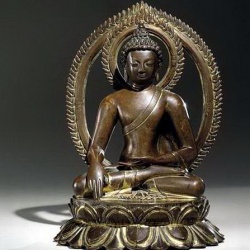Pratimoksha Explained
The Pratimoksha is a Buddhist moral discipline(skt.).
A loose translation of the term is "personal liberation", and thus the discipline is concerned with the Buddhist's quest for personal liberation, and originated with the Pratimoksha Vows given by the Buddha to his followers.
"Prati" means 'towards' or 'every', "moksha" liberation from cyclic existence.
The Pratimoksha comprehends the vows for nuns and monks (Buddhist monastics) as well as vows for the lay followers of Buddhism.
The Pratimoksha belongs to the Vinaya of the Buddhist doctrine and is seen as the very basis of Buddhism.
The Pratimoksha of the Mulasarvastavadin lineage, followed in Tibetan Buddhism, is taken for the whole life and the vows end when the person who received it died or has broken one or more of the four root vows.
On the basis of the Pratimoksha there exist in Mahayana Buddhism two additional set of vows:
The Bodhisattva vows and the Vajrayana vows.
If these two set of vows are not broken, they will last to future lives.
There is also a Dharmaguptaka Pratimoksha, followed in Chinese and Vietnamese Buddhism, as well as some orders of Buddhism in S. Korea.
Patimokkha in Theravada
See main article: Patimokkha. The Patimokkha is the Pali equivalent of Pratimoksha (Sanskrit).
It is being followed by the monks of the Theravada lineage (Thailand, Sri Lanka, Myanmar, Cambodia and Laos).
Division in the Mulasarvastavadin Lineage
There are eight types of Pratimoksha vows:
The three set of Householders vows (for Lay-Followers)
Fasting Vows (skt. Upavasa; tib. Nyung ne) - 8 vows
Laymans' Vows (skt. Upasaka; tib. Genyen) - 5 vows
Laywomans' Vows (skt. Upasika) - 5 vows
Upaasak means 'worshipper' and Upasikaa 'female worshipper.'
The Laymans' and Laywomans' Vows
The laywoman and layman Pratimoksha consists of 5 vows.
They are also named as The Five Shilas (skt. moral discipline):
(1) to refrain from killing
(2) to refrain from stealing
(3) to refrain from false speech
(4) to refrain from sexual misconduct
(5) to refrain from using intoxicants
One is not obliged to take all five vows.
The commentaries describe seven types of lay followers:
Promising to keep just one vow
Promising to keep certain vows
Promising to keep most of them
Promising to keep all five
Keeping all five and also promising to keep the pure conduct of avoiding sexual contact
Keeping all five, pure conduct, and wearing robes with the promise to behave like a monk or a nun
Lay follower of mere refuge. This person is unable to keep the vows but he promises to go for refuge to the triple gem until death.
The five set of vows Monks and Nuns
Male Novices' Vows (skt. Sramanera, tib. Getsul) - 36 vows
Female Novices' Vow (skt. Sramanerika, tib. Getsulma) - 36 vows
Probationer Nun's Vows (skt. Siksamana)
Full Nun's Vows (skt. Bhikshuni, tib. Gelongma) - 364 vows
Full Monk's Vows (skt. Bhikshu, tib. Gelong) - 253 vows
Only full monks and full nuns are seen as full members of the buddhist monastic order.
A group of minimum 4 full ordained is seen as a Sangha.
The Pratimoksha tells also how to purify faults, how to solve conflicts and deal with all kinds of situations which can happen in the Sangha Community.
Resources and Literature
Mulasarvasatavadin Lineage
Novice Vows: Lama Mipham's commentary to Nagarjunas "Stanzas for a Novice Monk" together with "Essence of the ocean of Vinaya" by Tsongkhapa ISBN 81-86470-15-8 (LTWA India)
Full Monk Vows: "Advice from Buddha Sahkyamuni" by HH the 14th Dalai Lama, ISBN 81-86470-07-7 (LTWA India)
Complete Explanation of the Pratimoksha, Bodhisattva and Vajrayana Vows: "Buddhist Ethics" (Treasury of Knowledge: Book Five), Jamgon Kongtrul Lodro Taye, ISBN 1-55939-191-X, Snow Lion Publications
Monastic Rites by Geshe Jampa Thegchok, Wisdom Books, ISBN 0-86171-237-4
Ngari Panchen: Perfect Conduct: Ascertaining the Three Vows, Wisdom Publication, ISBN 0-86171-083-5 (Commentary on the three sets of vows by Dudjom Rinpoche)
"Buddhist Monastic Discipline: The Sanskrit Pratimokksha Sutras of the Mahasamghikas and Mulasarvastavadins" by Charles S. Prebish, India, Motilal Banarsidass, ISBN 81-208-1339-1




